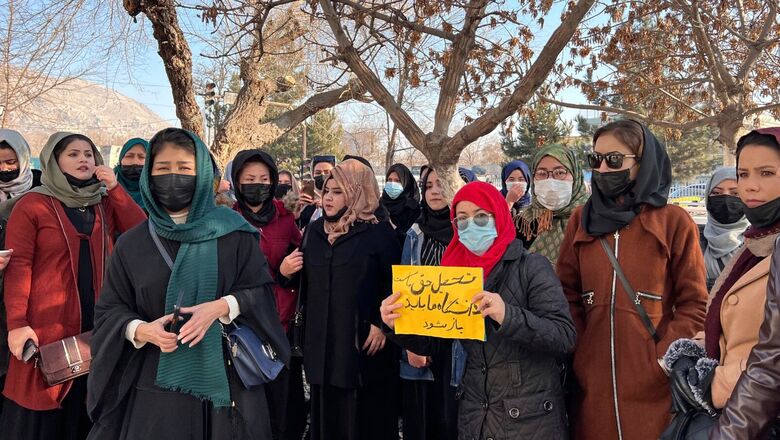
views
Taliban’s Supreme Leader Hibatullah Akhundzada is under severe pressure from powerful figures in the government to reverse his decision to ban university education for women, sources close to Afghanistan’s ruling dispensation have told CNN-News18.
Interior (Home) Minister Sirajuddin Haqqani and Defence Minister Mullah Mohammad Yaqub are set against the much-reviled decision to ban women from universities and are negotiating with Akhundzada to undo the proscription, sources said.
The anticipated outcome is for Akhundzada to bow to the wishes of the two senior ministers, as well as the international community, including India. If the Taliban supremo does not relent, it would definitely rend the unity of the government. It is even thought likely that this issue may be the spark that lights the conflagration of another civil war in the devastated country.
“It will be good news for us,” a senior Taliban official said. “Otherwise the alternative is civil war, which is not good for Afghanisatan.”
On Tuesday, Afghanistan said it had outlawed university education for women because women were dressing ‘improperly’: in the words of the higher education minister, “as if they going to a wedding instead of college”.
The ban comes in the backdrop of a widening political schism between the moderate and extremist factions of the Taliban. The Taliban stormed to power in Kabul in August last year as American military withdrew in chaos after nearly two decades of occupation.
Haqqani and Yaqub (the son of Taliban founder Mullah Muhammad Omar), who lead the moderate faction, have been attempting a rapprochement with major foreign powers as they struggle to manage Afghanistan’s shattered economy. Together they control the security forces and hold sway over large swathes of the country.
Akhundzada, who is based in the southern city of Kandahar, appears to be at odds with these two powerful deputies who are tasked with the practical responsibilities of running the government. Mullah Abdul Ghani Baradar, a first deputy prime minister, is thought to be more closely aligned with the supreme leader at this point, although he too is in favour of women’s education. Haqqani, Yaqub and Baradar are the three senior-most deputies of Akhundzada.
Top Taliban ministers met at the Arg presidential palace in Kabul on Saturday to try find a solution. Helping matters is also the fact that Afghanistan’s chief justice and justice minister Abdul Hakim Ishaqzai, who was previously an opponent of girls’ education, is now on the side of Haqqani and Yaqub.
On Friday, Haqqani spoke to Akhundzada on the phone and conveyed to him his staunch opposition to the decision to ban women from college. He is said to have told the supreme leader that he is unable to face his supporters or explain the decision to them.
The ban was preceded by political moves initiated by the supreme leader over the last few months. In September, he sacked the education minister Noorullah Munir and replaced him with Maulvi Habibullah Agha, a staunch loyalist. And then in October, he fired Abdul Baqi Haqqani as the higher education minister and installed another loyalist, Neda Mohammad Nadeem.
The education ministry oversees primary and secondary education whereas the higher education ministry is in charge of university studies. Secondary education was already barred to girls before the latest jolt last week.
With the economy in the doldrums and no formal relations with the international community, the moderate group may even consider a push to replace Akhundzada as the supreme leader, or Amir-ul-Momineen.
In such an eventuality, Ishaqzai, the chief justice, could have a good claim to the leadership of Taliban. But with powerful warlords and battlefield veterans also holding important political posts, the political salience of the Amir would be as a figurehead and conscience-keeper rather than power player.
Read all the Latest News here


















Comments
0 comment